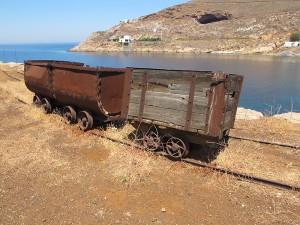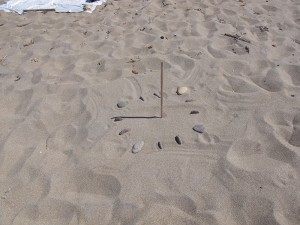I sat on the beach the other day and listened to the waves lapping against the sloping sand. While the currents slowly rolled the soft-colored stones rounder, my mind drifted from the page I was reading to the motorboat out in the bay and then back to the page only to be distracted again by the clarity of the sky and shadowy islands lying not-so-distant from my colorful towel. I wonder if Emerson ever thought that one of his essays would become the subject of this writer’s musing or his book find its way to this sandy place? Probably. I am sure that his young admirer Walt Whitman would have felt at home here too. He’ll be next. “Leaves of Grass” during a wet Aegean February might be a good read for me. In any case, in his essay ‘Circles’ published in 1841, Ralph demonstrates prescience. In the modern world the concept of circles and cycles is common. Society knows the words ‘reincarnation’ and ‘oneness’ as well as other ’round’ concepts. Buddhism is not the mysterious idea it was so many decades ago and the phrase “what comes around, goes around” has been in the modern lexicon since, I suppose, the early 1960s. “Ye reap what ye sow” has been around longer and means much the same thing. What Emerson speaks of, I feel, is something larger than that. Ideas come and go and those who live in the past naturally point in fear and condemnation towards any revolution of thought or action that may threaten their temporary power. That’s a good word too—revolution. It implies a turning. Seasons turn, wheels turn and the wheel inside the wheel turns as an analogy of an invisible world we may only glimpse in dreams or moments of sublime inspiration, connections with something larger outside ourselves. Then again, there I was sitting on a beach in an archipelago called the Cyclades, or “The Circle”. Hmm…Here is an excerpt from Emerson’s essay titled “Circles”, published in 1841:
“There are no fixtures in nature. The universe is fluid and volatile. Permanence is but a word of degrees. Our globe seen by God is a transparent law, not a mass of facts. The law dissolves the fact and holds it fluid. Our culture is the predominance of an idea which draws after it all this train of cities and institutions. Let us rise into another idea; they will disappear. The Greek sculpture is all melted away, as if it had been statues of ice: here and there a solitary figure or fragment remaining, as we see flecks and scraps of snow left in cold dells and mountain clefts in June and July. For the genius that created it creates now somewhat else. The Greek letters last a little longer, but are already passing under the same sentence and tumbling into the inevitable pit which the creation of new thought opens for all that is old. The new continents are built out of the ruins of an old planet; the new races fed out of the decomposition of the foregoing. New arts destroy the old. See the investment of capital in aqueducts, made useless by hydraulics; fortifications, by gunpowder; roads and canals, by railways; sails, by steam; steam, by electricity.”
“There are no fixtures in nature…” Indeed. The waves roll and dissolve stones to sand, the wind shifts and islands disappear. My eye wanders from the page to the sky and back again. I blame the Meltemi for these ramblings. The wind rushes, sometimes feeling as if it is blowing through my head. In one ear and out the other.
JDCM


